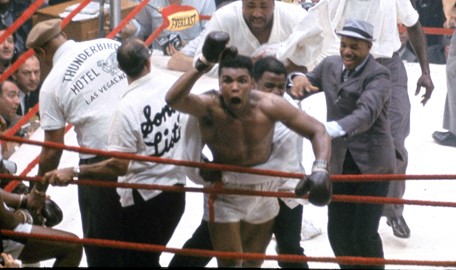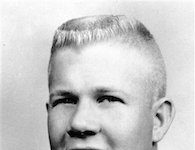On February 25, 1964, 22-year-old Cassius Clay became the world heavyweight boxing champion, defeating Sonny Liston in an upset.
“I Shook Up the World”
Muhammad Ali, who was then known as Cassius Clay, was an Olympic champion who had won his first 19 professional fights. At 22 years old, Clay was a promising young boxer, but few gave him a chance against heavyweight champion Sonny Liston, who had famously knocked out Floyd Patterson in the opening rounds of two fights.
Clay was a 7 or 8–1 underdog and people expected so little from the bout that only half the tickets at the Miami Beach Auditorium were sold. But Clay was confident, declaring in the weeks leading up to the fight that he would “float like a butterfly and sting like a bee.”
Clay used his superior quickness to frustrate Liston and avoid his famed left hook. He controlled the first four rounds, but he was forced to fight the fifth round nearly blind after a substance on Liston’s glove had gotten in his eyes. He spent the round dancing around the ring and managed to escape unscathed.
Clay, with his eyes cleared, dominated the sixth round. Liston, having injured his left arm, decided not to answer the bell for the seventh round. Clay danced about the ring in celebration, pointing at sportswriters in the crowd and repeatedly shouting, “I’m the greatest” and “I shook up the world.”
“The fight—Clay against Liston—restored balance and intelligence to the concept of boxing,” wrote Sports Illustrated’s Tex Maule. “The boxer, using his skills with aplomb and courage and forethought, confounded and defeated the slugger.”
The Classic Sports Channel on YouTube has footage of the fight.
Sources in this Story
- The Sweet Science: Clay vs. Liston: “I Shook Up the World!”
- Sports Illustrated: Yes, It Was Good And Honest
- YouTube/Classic Sports Channel: Cassius Clay (Muhammad Ali) vs. Sonny Liston (Full Fight, 25th February 1964)
- East Side Boxing: The Clay-Liston Fights: Fake or Legitimate?
- Los Angeles Times: 25 Years Later: A Fix or a Fist?
- The New York Times (AP): Clay Says He Has Adopted Islam Religion and Regards It as Way to Peace
- PBS: Elijah Muhammad and the Nation of Islam
- ESPN: He is simply…The Greatest
- CNN: Muhammad Ali, ‘The Greatest,’ dies at 74
- ESPN: Liston was trouble in and out of ring
Ali’s Post-Bout Conversion
Clay celebrated his victory in the hotel room of Nation of Islam (NOI) leader Malcolm X, who had served as an advisor. A day after the fight, Clay announced that he was converting to Islam and changing his name to Cassius X, and later to Muhammad Ali. A dispute surrounding Ali’s conversion influenced Malcolm X’s decision to leave the NOI a month later.
The smooth-talking, clean-living Clay could have become a popular and marketable champion, but his association with the so-called “hate religion” caused his popularity to plummet. It would be years before the general public acknowledged him as Muhammad Ali.
Before the rematch with Liston there were rumors that supporters of Malcolm X, who had been assassinated four months earlier by Nation of Islam members, would try to kill Ali during the fight. One of the fight promoters took out a three-day, $1 million life insurance policy on Ali. The fight went off with no violence.
Boxing Content
- Ali Evades Draft
- Joe Louis Knocks Out Max Schmeling
- “Cinderella Man” James Braddock Defeats Max Baer
Controversy and Rematch
After the fight, there were allegations that the fight had been fixed by the Mafia, which had close ties to Liston. A Florida state investigation found no evidence of wrongdoing.
The rematch, fought May 25, 1965, ended in even greater controversy when Liston was knocked out in the first round by a “phantom punch.” Again, no wrongdoing was discovered, but the fight remains controversial.
Biography: Muhammad Ali
Muhammad Ali was born Cassius Clay, Jr., on January 17, 1942. Ali’s boxing career began in 1954 after his bicycle was stolen and he wanted to “whup” the thief. His pugilistic talents took him to the 1960 Rome Olympics, where he won gold.
Ali lost his heavyweight title in 1967 after he refused to join the Army and was convicted of draft evasion. He was banned from boxing for the next three years, spending time speaking out against the Vietnam War and slowly gaining public support.
He lost his first professional fight in 1971 to heavyweight champion Joe Frazier, the first of three memorable fights with Frazier. He regained his heavyweight championship in 1974, seven years after it had been stripped away, when he defeated George Foreman in the “Rumble in the Jungle.”
Ali retired from boxing in 1981; just three years later, he was diagnosed with Parkinson’s disease, which causes tremors, impaired speech and movement, and muscle rigidity. Ali dedicated his life to charity work and became one of America’s most beloved figures. He was widely regarded as the greatest boxer of all-time.
Ali died on June 3, 2016, of septic shock at age of 74. He was laid to rest in a public funeral a week later in Louisville.
Biography: Sonny Liston
Charles “Sonny” Liston grew up in a shack in Arkansas, the 24th of 25 children by an abusive father. Illiterate, he turned to a life of crime and spent two years in prison, where he learned to box. Even as his boxing career was taking off, he frequently had run-ins with the law and was seen as an unlikable thug by boxing fans.
He became heavyweight champion in 1962 by knocking out respected champion Floyd Patterson in the first round. He defeated Patterson in the rematch and became the most feared man in boxing before losing to Ali.
Liston was accused of taking a dive in the rematch with Ali, perhaps at the order of the Mafia or out of fear of the Nation of Islam. After taking a year off from boxing, he failed to regain a chance for the heavyweight title and retired in 1969. Two years later, his wife discovered him dead after returning from a trip. The cause and exact date of his death are unknown.
Reference: Muhammad Ali
ESPN hosts articles from former New York Times journalist Robert Lipsyte about his many encounters with Ali over five decades. The New York Times has an archive of articles chronicling Ali’s life and career.
The Ali Center is a museum in Louisville that teaches visitors not only about his life and career, but also about his philosophy and teachings. The web site focuses on the center’s community work and global initiatives.











